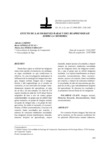Efecto de las imágenes raras y del reaprendizaje sobre la memoria

View/
Use this link to cite
http://hdl.handle.net/2183/7617Collections
Metadata
Show full item recordTitle
Efecto de las imágenes raras y del reaprendizaje sobre la memoriaDate
2008Citation
Revista Galego-Portuguesa de Psicoloxía e Educación, 2008, 16: 1691-82. ISSN: 1138-1663
Abstract
[Resumen] Desde hace siglos se utilizan las imágenes
raras como ayuda a la memoria, sin embargo,
se sigue estudiando en qué condiciones es
efectiva. En esta investigación analizamos la
influencia de la estrategia de imagen (sin ima-
gen, imagen normal, imagen rara e imagen
mixta) y del reaprendizaje en el estudio de
oraciones, en tres intervalos de tiempo: inme-
diatamente después del aprendizaje, al cabo
de un día y de una semana. Un total de 225
sujetos (media de edad de 14.45 años) fueron
asignados al azar a uno de cuatro grupos
experimentales: un grupo que no utilizó imá-
genes mentales, un grupo de imagen normal,
un grupo de imagen rara, y un grupo de ima-
gen mixta. Se midió el recuerdo, el reconoci-
miento, el falso reconocimiento, el acceso a la
oración, ítems recordados por oración, y
número de oraciones totalmente recordadas.
Las imágenes mixtas manifestaron, inmedia-
tamente después de aprendizaje, mayor
recuerdo, mayor acceso a la oración, y mayor
número de oraciones totalmente recordadas
que las imágenes raras, las imágenes norma-
les, y que el grupo que no utilizó imágenes
mentales. Los sujetos manifestaron un mayor
recuerdo, reconocimiento, falso reconoci-
miento, acceso a la oración, ítems recordados
por oración, y número de oraciones totalmen-
te recordadas, al cabo de una semana que des-
pués de un día, y que inmediatamente después
del aprendizaje. Se discuten los resultados y
se proponen nuevas líneas de investigación. [Abstract] For centuries bizarre imagery has been an
aid to memory yet the precise conditions for
its optimum effectiveness remain unknown.
In this study, the influence of image strategy
type (no mental imagery, normal imagery,
bizarre imagery or mixed imagery) on the
learning of sentences and relearning were
evaluated at three time intervals (immediate,
at one-day and one-week). A total of 225 sub-
jects (mean age 14.45 years) were randomly
assigned to one of four experimental groups:
a no mental imagery group, a normal imagery
group, a bizarre imagery group or a mixed
imagery group. Thereafter, recall, recogni-
tion, false recognition, sentence access, items
per sentence recalled, and number of full sen-
tences recalled were assessed. Mixed imagery
exhibited, immediately after learning session,
greater recall, sentence access, and full sen-
tences recalled than the bizarre imagery, nor-
mal imagery, and no mental imagery group.
Subjects exhibited significantly greater recall,
recognition, false recognition, sentence
access, items per sentence recalled, and num-
ber of full sentences recalled at one week
interval than after one day or immediately
after first learning session. The results are dis-
cussed and further lines of experimental rese-
arch are proposed.
Keywords
Imagen mental
Memoria
Recuerdo
Reconocimiento
Falso reconocimiento
Mental imagery
Memory
Recall
Recognition
False recognition
Memoria
Recuerdo
Reconocimiento
Falso reconocimiento
Mental imagery
Memory
Recall
Recognition
False recognition
ISSN
1138-1663





